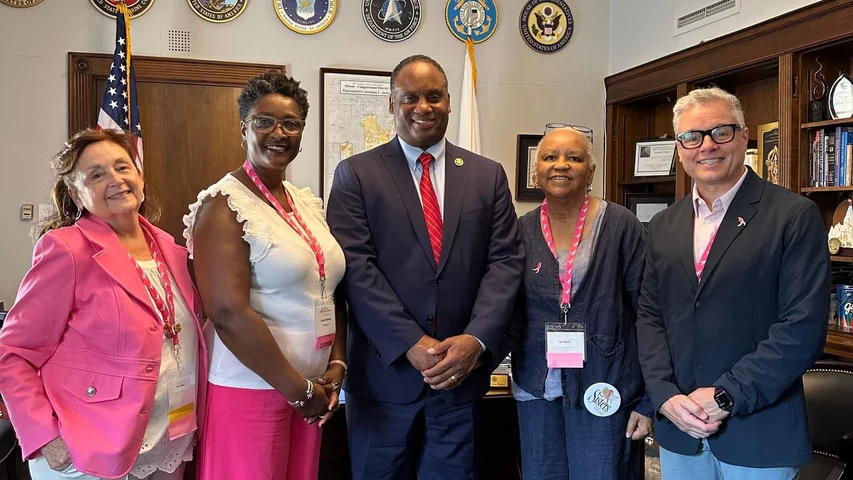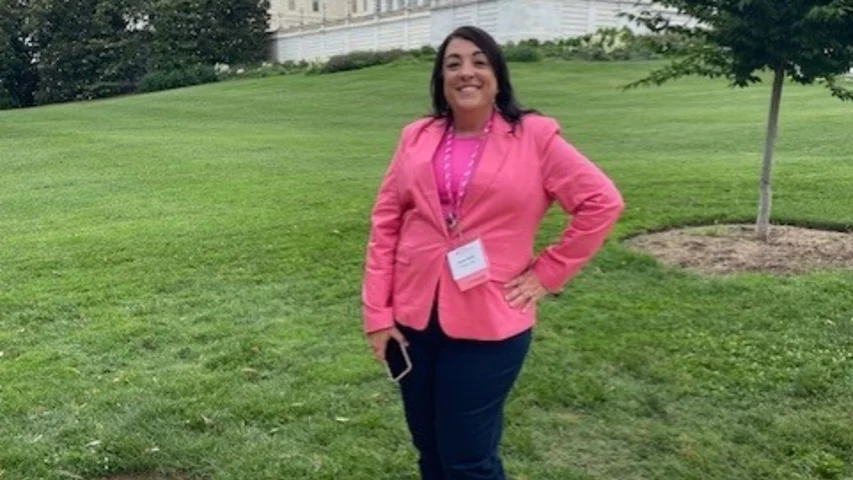Hundreds hit Capitol Hill to press Congress for breast imaging payment reform
Hundreds of healthcare advocates hit Capitol Hill on Tuesday to press Congress for breast imaging payment reform.
The drive was led by Susan G. Komen, a Dallas-based foundation focused on ending the disease through screening, education and research. Those involved want lawmakers to pass three already-proposed bills aimed at improving access to imaging and other services.
“We have high-quality healthcare in the United States and the tools to detect breast cancers early,” Molly Guthrie, VP of public policy and advocacy at SGK, said in a June 11 announcement. “But too many people cannot access or afford the services or treatment they need, impeding our ability to save all lives from breast cancer. Congress has introduced legislation that would resolve some access and affordability barriers, and now is the time for passage.”
Komen is advocating that lawmakers approve three bills to address this issue:
1) The Access to Breast Cancer Diagnosis Act: Bipartisan members of Congress reintroduced this legislation in the House and Senate last year. The ABCD Act would eliminate any copays and other out-of-pocket expenses for tests to diagnose breast cancer.
Under the Affordable Care Act, payers were required to provide no-copay coverage for mammography. However, about 10% of breast screening exams require follow-up tests such as MRI or ultrasound, which often are not covered. Patients can end up paying upward of $1,041 for these exams, Komen estimates.
“This commonsense legislation would ensure that a warranted follow-up diagnostic examination is also covered by health insurers at no out-of-pocket cost to the patient,” co-sponsor Sen. Katie Britt, R-Ala., said in September. “No woman across America should be faced with the impossible choice between affording basic necessities such as food or being able to confirm whether she has a life-threatening illness.”
2) Screening for Communities to Receive Early and Equitable Needed Services (SCREENS) for Cancer Act: Introduced in the House and Senate last June, the bipartisan bill would reauthorize the National Breast and Cervical Cancer Early Detection Program through 2028.
This “lifesaving” program provides breast and cervical cancer screening and diagnostic services for low-income and underinsured women who do not qualify for Medicaid. Since 1991, the program has served over 6.1 million individuals, detecting almost 77,000 cancer cases and 24,000-plus premalignant breast lesions.
“Cancer touches every community across the country, but with proper screening and treatment, we can save lives and prevent heartache of families,” co-sponsor and Sen. Tammy Baldwin, D-Wis., said last year. “The [National Breast and Cervical Cancer Early Detection Program] has a proven track record of reaching underserved communities and providing preventative and diagnostic cancer services nationwide.”
The Energy and Commerce Committee favorably reported on the SCREENS Act in March, advancing the bill to the full House. Same for in the Senate, where the Health, Education, Labor, and Pensions (HELP) Committee advanced the legislation in December. Along with Susan G. Komen, it also is supported by the American College of Radiology, Society of Breast Imaging, National Consortium of Breast Centers, National Comprehensive Cancer Network and others.
3) The Safe Step Act: Reintroduced in the House and Senate last year, the bipartisan legislation would ensure that patients can safely and efficiently access the best treatments by improving step therapy protocols.
Sometimes referred to as a “fail first” approach, these protocols can lead to unnecessary care delays and require patients to try ineffective medications before finding the right treatment.
“As a physician, I took an oath to put patients first. The Safe Step Act does exactly that,” Rep. Raul Ruiz, MD, D-Calif., said last year. “It is not safe or fair for patients to be forced to use medications that don't work for them simply because of insurance companies' protocols that do not take the patient's unique health needs into account. These delays can cause unnecessary pain, suffering, and cost for patients.”
The legislation was reported favorably out of the Senate HELP Committee in May 2023.
Susan G. Komen said it remains hopeful that all three bills will eventually reach the president’s desk.
“These policies cannot afford to languish inaction—that is the resounding message advocates are spreading across Capitol Hill,” Guthrie said Tuesday. “We appreciate the bipartisan and bicameral leadership on these bills and efforts by lawmakers to ensure everyone in this country has access to high-quality, affordable healthcare.”












